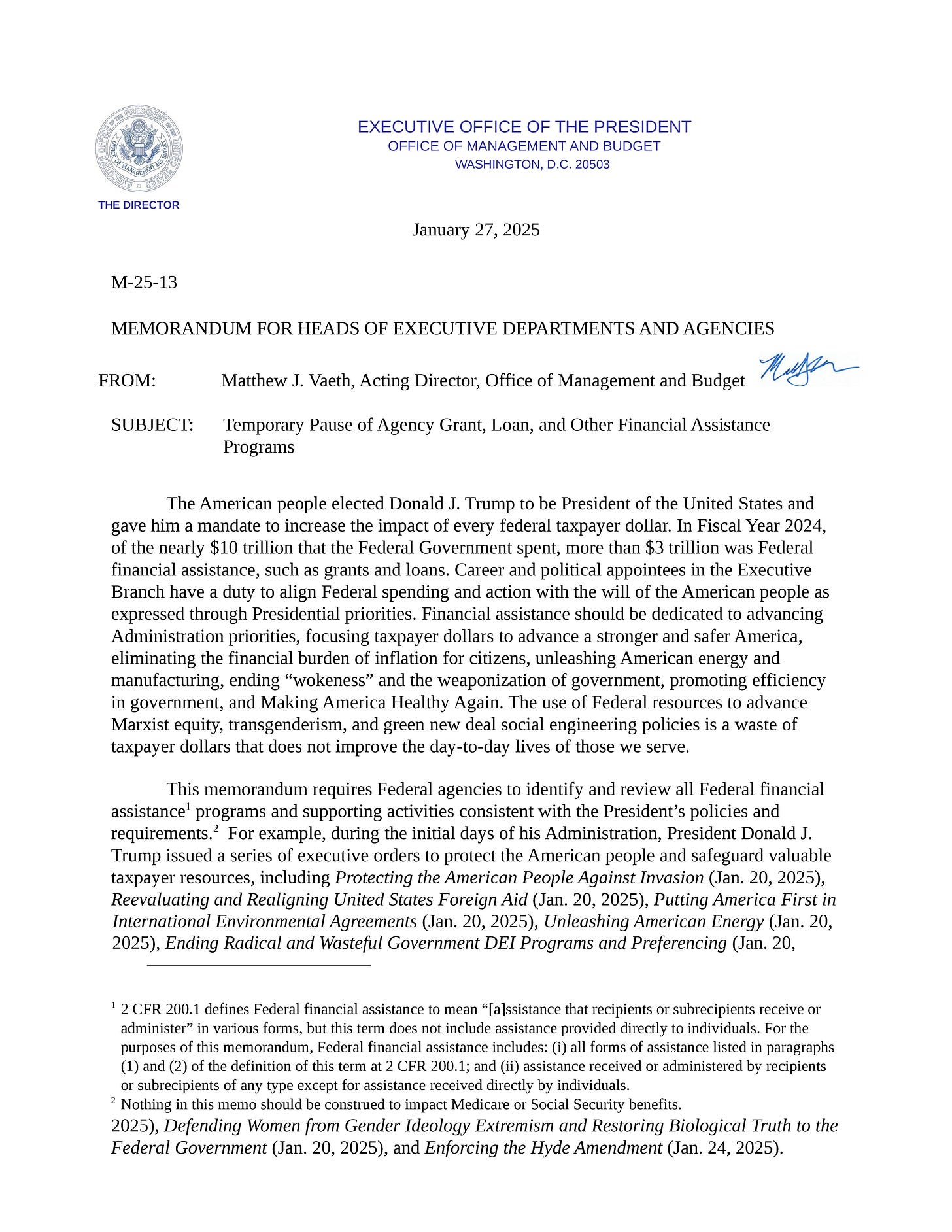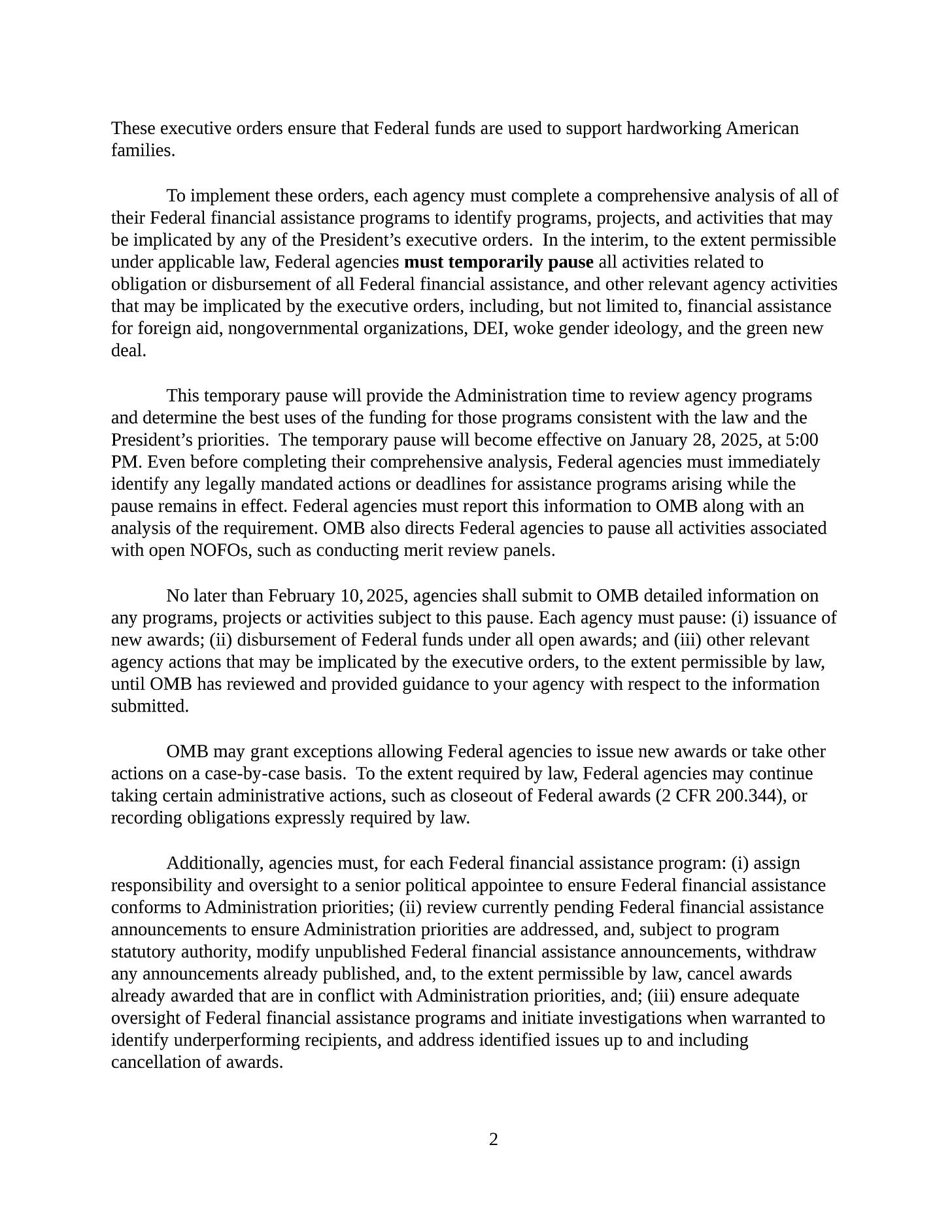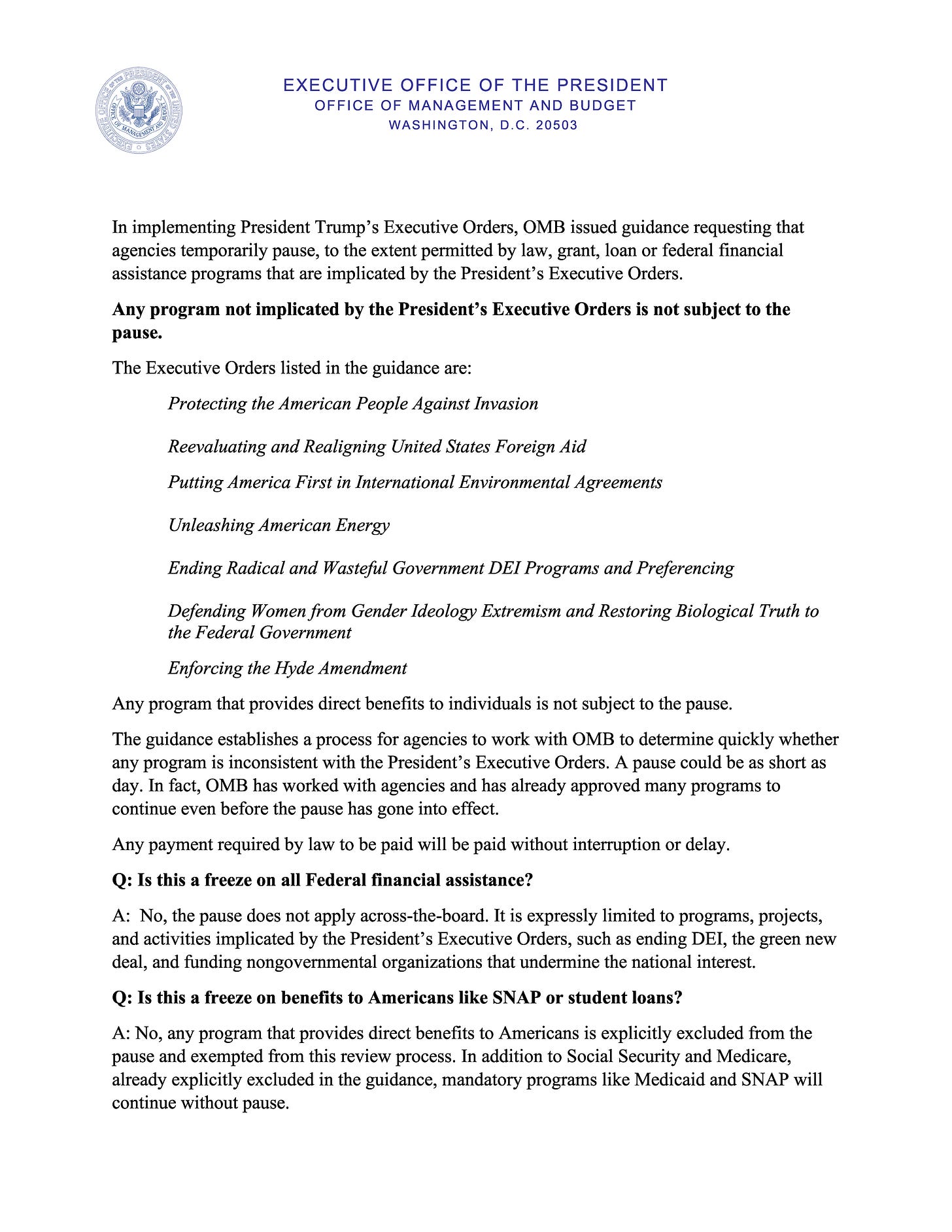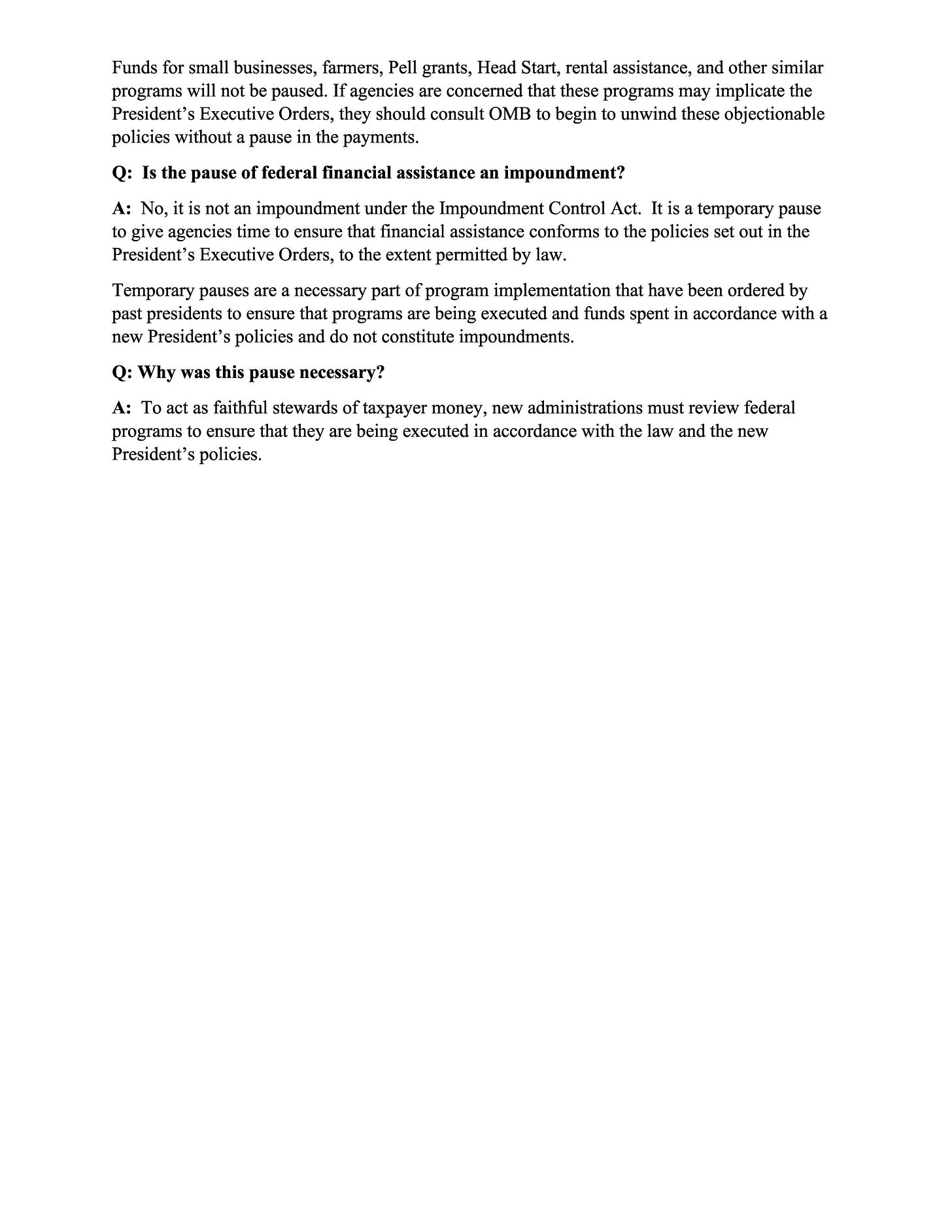OMB to OMG to WTF: Destroying the Republic one memo at a time.
How the Trump Administration managed to blow up the entire federal government in one afternoon, and then tried to cram the sh*t back in the Goose.
It’s been a rough twenty-four hours.
They say the pen is mightier than the sword. If you ever needed convincing of that fact, the “OMB memo debacle” (as I’m going to call it) will go down in the annals of policy history as the time we nearly destroyed the Republic with red tape.
The law lives in technicalities. The Trump Administration got a very painful lesson in that fact in the last day.
Apparently, None of Us Can Read (According to Stephen Miller)
Like a bolt of lightning from Mt. Olympus, the OMB dropped a memo on us that sent shockwaves through every corner of the government and beyond. If you haven’t read it yet, I highly encourage you to read the memo yourself—I’m a firm believer in primary documents.
(If you can’t read it in this posting on my substack, you can download the memo for yourself and read the PDF.)
Ok, done reading? Good. Let’s proceed.
The Immediate Fallout: Confusion, Panic, and a Government in Crisis
Within minutes of this memo hitting the streets, I was inundated with questions: Would FEMA money come? What about FAFSA, Pell Grants, student loans, or research funding? My inbox exploded with variations of “What about…?”
So, I put on my policy hat, pulled up the memo, and started reading.
A few things immediately stood out:
The word “discretionary” is nowhere in the memo.
The word “all” appears seven times.
The word “must” appears six times.
So, when I—who, let’s be honest, am a policy genius—read this thing, I had to break the bad news: grants, loans, and aid were effectively frozen. Not necessarily denied, but delayed. Likely for at least 90 days, if not longer.
This is Illegal—Full Stop
I said it last night, and I’ll repeat it: This is an unlawful impoundment under the Impoundment Control Act of 1974 (ICA). We’ll get to that shortly.
But first, let’s talk about how I read this memo:
“I, Donald Trump, have decided that I won, you lost, and so I’m sticking my foot up the ass of every organ of government. Until I personally approve where the money goes, no money is going anywhere. So let it be written, so let it be done!”
And then he presumably stomped off like Yul Brenner in The Ten Commandments.
Nowhere in this memo is discretionary spending mentioned (not that it would matter if it did, but it would have created considerably less confusion.) So, when I read the memo, to me, the only exemptions, as a matter of law, seemed to be:
Social Security
VA benefits
Federal retirement benefits
SNAP, WIC, TANF, CHIP
And, given the memo's sweeping language, even those appeared potentially on the chopping block.
Government Crashes, Lawsuits Fly
While I was getting a tooth extracted today (which, frankly, was less painful than reading this memo), chaos erupted:
Medicare & Medicaid websites crashed.
Nearly every federal benefit portal went down.
The White House and Congress were barraged with questions, lawsuits, and outrage.
At 3 PM, Minnesota Governor Tim Walz called it what it was: an illegal impoundment.
A great idea - sue the bastards (you can sue the federal government as a state, it’s a special type of lawsuit called a “Parens Patriae” suit. In this case, the State of Minnesota is going to sue the Federal Government on behalf of the people of Minnesota who are being harmed by not receiving federal benefits.)
So, things continue to spiral; everything continues to implode. Unsurprisingly, states rush to court. Around 5PM Eastern, the Trump Administration gets smacked with a TRO (temporary restraining order). Judge Loren L. AliKhan for the U.S. District Court for the District of Columbia said she would put the matter on a temporary pause as she considers arguments from the U.S. government and the plaintiffs in the case, who had asked for the court to issue a restraining order against the government to stop the funding freeze.
Stephen Miller’s Faceplant on CNN
Then came Stephen Miller, desperately spinning on CNN: We meant ‘discretionary’ spending. Watch and judge for yourself, I have the video for you below.
First: That word (discretionary) isn’t in the memo. Anywhere. After he said that, I went back and checked… again.
Second: Miller openly admitted this was impoundment even if he didn’t realize that was what he was saying. Even if he was talking only about certain parts of the budget, it’s still illegal. And he openly admits this is a policy/ideology objection, not that these departments were spending the money in a way contrary to how the money was allocated, authorized, or appropriated by Congress.
Then Came the “Oops” Memo
Now, there’s a new memo (tonight)—the administration’s attempt at walking back an illegal action after getting smacked with legal challenges and public backlash.
So again, apparently none of us know how to read.
But I call SHENANNIGANS!
SHENANNIGANS! SHENANNIGANS!
SHENANNIGANS!!!!!!!!!!!!!!!!!!!!!!!!!!!!
This wasn’t a misunderstanding. It was a deliberate attempt to freeze government spending. And now that they got caught, they’re scrambling for plausible deniability.
Let’s call this what it is - a blatant attempt at impoundment.
What the heck is IMPOUNDMENT?
In the vast machinery of the American government, few powers are as fundamental as the power of the purse—the ability to decide how money is spent. This power belongs to Congress, which passes budgets and appropriations bills, directing the government on where and how to spend federal funds. But what happens when a president refuses to spend money that Congress has legally allocated?
That’s where impoundment comes in.
A Presidential Tug-of-War
Imagine a newly elected president, let’s call him President Adams, stepping into office. Among the policies he campaigned on, he was adamant that the government was spending far too much on a particular program—say, a new environmental cleanup initiative. However, before he took office, Congress had already approved funding for the program and signed it into law. Agencies were expecting the money. Contractors had made plans. But President Adams, believing it was a wasteful expenditure, instructs his budget office not to distribute the funds.
(By the way, if you haven’t figured out by now, this isn’t a hypothetical, but a history lesson.)
In essence, he has impounded the money—choosing to withhold or delay spending it, even though Congress had already authorized it.
Why Would a President Impound Funds?
Presidents have historically used impoundment for a variety of reasons, including:
Policy disagreements – Not wanting to fund programs they politically oppose.
Fiscal conservatism – Believing the money should not be spent to reduce deficits.
Bureaucratic inefficiency – Arguing that an agency is not ready to use the funds appropriately.
Impoundment in History: Nixon and the Showdown
While some early presidents used impoundment selectively, the most famous battle over impoundment came in the 1970s with President Richard Nixon. During his presidency, Nixon refused to spend billions of dollars appropriated by Congress for programs he didn’t support, including environmental and social welfare initiatives.
Congress, seeing this as an abuse of executive power, fought back. Lawmakers argued that if a president could simply ignore spending laws, he was undermining the entire system of checks and balances. Congress, after all, was the body entrusted with budgetary authority—not the president.
In response, Congress passed the Congressional Budget and Impoundment Control Act of 1974, effectively stripping the president of unilateral impoundment power. Under the law:
A president cannot simply refuse to spend money that Congress has appropriated.
If a president wants to withhold or delay funds, they must formally request approval from Congress.
Congress can either approve or reject the impoundment request.
This law ended the unchecked use of impoundment and reinforced that Congress—not the president—has the final say over federal spending.
A Tale of Two Memos
The first memo (January 27) is just completely off the rails. The first memo might as well have just said, “I Donald Trump, with my very good brain, have decided, the money is all mine, and I’ll decide if anyone gets any of it,” and just signed it.
That would have had the same legal effect as the memo they actually issued, and would have saved a considerable amount of time.
The second memo (January 28) tries to be the more “kindler, gentler, we were just kidding” memo, but it’s also completely illegal as well.
Here’s why they’re both ridiculous.
The January 27 Memo: A Clear Violation of the ICA
The first OMB memo, M-25-13, orders a government-wide pause on the disbursement of all federal financial assistance, including grants and loans. This order applies to funds already appropriated by Congress, effectively preventing agencies from distributing them. The memo states:
“Federal agencies must temporarily pause all activities related to obligation or disbursement of all Federal financial assistance, and other relevant agency activities that may be implicated by the executive orders.”
This directive is textbook impoundment. The ICA, specifically 31 U.S.C. § 1512(a), explicitly prohibits any executive official from preventing the obligation or expenditure of funds in a manner inconsistent with congressional intent. The president does not have unilateral authority to halt or redirect appropriated funds without submitting a formal rescission or deferral request to Congress under 31 U.S.C. § 1512(b). Yet, nowhere in the memo is there any mention of a formal rescission request.
Furthermore, the memo does not cite any statutory authority allowing the administration to issue such a broad pause. Instead, it relies on vague references to presidential priorities, claiming:
“Financial assistance should be dedicated to advancing Administration priorities… This memorandum requires Federal agencies to identify and review all Federal financial assistance programs and supporting activities consistent with the President’s policies and requirements.”
This reasoning is irrelevant under the ICA. The executive branch cannot use political priorities to justify withholding congressionally approved funds. Spending decisions are binding law, not optional guidelines that can be modified to suit an administration’s agenda.
The January 28 Memo: A Misguided Attempt at Justification
After widespread criticism and legal concerns, OMB issued a second memo on January 28, 2025, attempting to clarify and justify the initial funding pause. This memo acknowledges that agencies must review the legality of pausing funds but still maintains the de facto impoundment:
“Federal agencies must identify any legally mandated actions or deadlines for assistance programs arising while the pause remains in effect.”
This is a legally problematic shift in responsibility. The executive branch does not have the authority to force agencies to reevaluate whether they should follow the law. Congress has already made that determination by passing appropriations bills. The ICA mandates that once funds are appropriated, they must be spent as directed unless Congress itself approves a rescission or deferral. By instructing agencies to pause all obligations and disbursements until OMB provides further guidance, the memo continues to unlawfully delay federal spending.
Moreover, the second memo suggests that OMB may allow exceptions on a case-by-case basis, stating:
“OMB may grant exceptions allowing Federal agencies to issue new awards or take other actions on a case-by-case basis.”
This provision contradicts the fundamental structure of the ICA. The ICA does not grant the executive branch discretion to approve or deny the release of funds as it sees fit. Funds must be spent unless Congress acts to rescind them. The administration is not Congress and cannot insert itself as a gatekeeper of appropriated funds.
Why These Actions Constitute an Unlawful Impoundment
Under the ICA, an impoundment occurs when the executive branch:
Defers, delays, or withholds the obligation or expenditure of appropriated funds.
Fails to submit a rescission or deferral request to Congress for approval.
Acts unilaterally to block spending without congressional authorization.
Both memos meet all three criteria:
Deferral: The January 27 memo orders an indefinite pause on spending, effectively preventing agencies from obligating funds.
Failure to Notify Congress: Neither memo mentions a rescission or deferral request, as required by 31 U.S.C. § 1512(b).
Unilateral Executive Action: The OMB directives assert executive discretion over funding already enacted into law, violating the ICA’s framework.
Additionally, 31 U.S.C. § 1513 states that if an agency withholds funds without proper congressional notification, GAO (Government Accountability Office) or Congress can take action to enforce compliance. The administration’s directives are therefore subject to legal challenge.
Now, I realize when Congress is nothing but a bunch of clowns busy fawning over the President, the idea of “Congress” doing anything is hollow. Thus, I found Govenor Walz’s claim that “Tom Emmer” supported anything to be laughable. Tom Emmer is a MAGA stooge, thus, if he supports anything, it will be only until the President ever so gently blows his direction, and then like a wisping reed, he’ll undoubtedly bend.
I do want people to note, however, this is perhaps one of the reasons why the President felt it imperative to dismiss all of the Inspectors General.
Why Inspectors General Are Important
Every federal agency has an Office of Inspector General (OIG)—an independent oversight body tasked with ensuring that government funds are spent as Congress directed. When it comes to impoundment, IGs have several tools at their disposal:
1. Investigating Whether Agencies Are Illegally Withholding Funds
Inspectors General have the authority to audit federal agencies and determine if executive officials are failing to spend appropriated funds as required by law. If a federal department suddenly stops disbursing grants, aid, or contracts without an approved rescission from Congress, an IG can open an investigation to determine whether officials are violating the ICA.
IGs can interview agency officials, review internal communications, and audit spending records to determine if funds are being improperly withheld.
If an IG finds that an agency is deliberately obstructing legally mandated spending, they can flag the issue to Congress and the Government Accountability Office (GAO) for further action.
2. Reporting Violations to the Government Accountability Office (GAO)
The GAO has statutory authority to investigate and rule on impoundment violations. If an IG determines that a department or agency is failing to disburse appropriated funds, they can refer the case to GAO, which can then issue a formal legal opinion stating that the executive branch has violated the ICA.
Under 31 U.S.C. § 1513 and § 1514, GAO has the power to determine whether an impoundment has occurred and report violations to Congress.
If GAO finds that the administration has violated the ICA, Congress can demand compliance, hold hearings, or even initiate legal action.
A key example? The Trump-Ukraine military aid scandal in 2019. When the administration withheld military assistance to Ukraine, the Department of Defense IG raised concerns, which led to a GAO investigation. The GAO later ruled that the impoundment was illegal because the administration never requested congressional approval to withhold the funds. That ruling became a major factor in Trump’s first impeachment.
3. Alerting Congress to Violations
One of the most powerful tools Inspectors General have is direct access to Congress. When an IG uncovers misconduct, they have a duty to inform the relevant congressional committees, particularly:
House and Senate Appropriations Committees (which oversee federal spending)
House and Senate Government Oversight Committees (which investigate executive misconduct)
If an IG finds that the administration is illegally withholding funds, they can send urgent reports to Congress that can trigger hearings, subpoenas, or legislative action to force compliance. This mechanism ensures that even if an administration wants to sweep impoundment under the rug, it will be exposed.
4. Referring Cases for Criminal or Civil Enforcement
While IGs do not have prosecutorial power, they can refer cases to the Department of Justice (DOJ) or Special Counsel if they find evidence of willful misconduct, fraud, or obstruction.
If administration officials falsify reports to hide an impoundment or retaliate against whistleblowers, IGs can recommend criminal investigations.
DOJ can then bring charges against individuals who engaged in unlawful conduct related to the impoundment.
5. Issuing Public Reports and Protecting Whistleblowers
One of the most powerful tools an IG has is transparency. If the administration is illegally impounding funds, an IG can issue public reports detailing what’s happening, increasing political pressure for compliance.
IGs can also protect whistleblowers—career government officials who blow the whistle on illegal impoundments. If a federal employee comes forward with evidence that funds are being unlawfully withheld, IGs can ensure they aren’t fired, demoted, or silenced.
The First Line of Defense Against Unchecked Executive Power
The Impoundment Control Act was designed to prevent exactly this kind of abuse—a president trying to override Congress’s power of the purse. While IGs can’t force the White House to comply, they play a crucial role in holding agencies accountable, exposing violations, and triggering enforcement mechanisms through GAO and Congress.
Without them, executive overreach could go unchecked, and the constitutional balance of power would be in serious jeopardy. That may go a long way in explaining why the President summarily (and probably unlawfully) dismissed them without cause and without proper notification and, then, less than a day later, threw the entire federal bureaucracy into a tailspin with these two budget memos.
Conclusion: A Clear Violation of Federal Law
The January 27 and January 28 OMB memos constitute an unlawful impoundment of funds under the ICA. While the second memo attempts to provide a veneer of legality, both directives functionally block spending without congressional approval, which is exactly what the ICA was designed to prevent. If the administration wishes to cancel or redirect spending, it must formally request a rescission or deferral from Congress. Until then, the law demands that these funds be spent as Congress intended.
The power of the purse belongs to Congress, not the presidency. Any attempt to undermine this principle is unconstitutional and a direct violation of statutory law. The administration’s actions are not merely a matter of executive discretion but a direct challenge to the rule of law.
Legal Challenges: This time, Alito can’t save him.
Hiegh HOOOOOOOOOOOOOOO!
HEIGH HOOOOOOOOOOOOOO… It’s off to (Supreme) Court we go.
Inevitably, we’ll wind up before the nine village idiots. (Sorry if my contempt is showing here, but it is just ridiculous.)
However, this time, Alito, Thomas, Roberts, Kavanaugh, and the rest really can’t save Trump unless they’re absolutely hell-bent on slitting their own throats. I mean, not even a “Twister” master is going to be able to contort their way to allow the President to make this one work.
The current Supreme Court’s conservative majority—which prides itself on textualism, originalism, and strict constructionism—faces an insurmountable contradiction if it attempts to side with the President on the impoundment issue. The **power of the purse is an explicitly enumerated power in the Constitution (Article I, Section 9, Clause 7), and Congress has already legislated a clear statutory framework through the Impoundment Control Act (ICA) of 1974.
If the Supreme Court attempts to uphold the President’s withholding of funds, it will have to completely contradict decades of its own rulings and principles.
The Key Supreme Court Precedents That Trap Them
The Court’s own rulings have consistently affirmed that Congress—not the President—controls federal spending. The most relevant precedents include:
1. Train v. City of New York (1975)
What it said: President Nixon attempted to withhold congressionally appropriated environmental funds, claiming executive discretion over spending.
SCOTUS unanimously ruled against Nixon, affirming that the President does not have unilateral authority to refuse to spend funds Congress has allocated.
Why it matters: This case directly upheld the ICA, making clear that once Congress appropriates funds, they must be spent unless Congress itself rescinds them.
2. Clinton v. City of New York (1998)
What it said: The Supreme Court struck down the Line Item Veto Act, ruling that the President cannot unilaterally cancel or withhold spending.
The decision emphasized that Congress alone has the power of the purse, and that allowing the President to cancel funds would violate the separation of powers.
Why it matters: The conservative justices—including Clarence Thomas—have repeatedly cited this case as a landmark ruling on executive overreach.
If they were to uphold the President’s withholding of funds in 2025, they would have to overrule their own position in Clinton v. City of New York.
3. Youngstown Sheet & Tube Co. v. Sawyer (1952)
What it said: In a defining case on executive power, the Court ruled against President Truman when he tried to seize the steel mills during the Korean War, stating the President does not have unilateral lawmaking authority.
Why it matters: If the President cannot seize steel mills during wartime, he sure as hell cannot unilaterally seize control over Congress’s spending decisions.
4. U.S. v. Midwest Oil Co. (1915)
What it said: The Court ruled that executive orders cannot override statutes passed by Congress.
Why it matters: The ICA is a statutory restriction on executive power. If SCOTUS upholds the President’s action here, it would be rejecting a century of precedent affirming Congress’s supremacy over statutory spending.
How the Conservative Justices Have Boxed Themselves In
The current six-member conservative majority on the Court consists of Chief Justice Roberts, Thomas, Alito, Gorsuch, Kavanaugh, and Barrett—all of whom have repeatedly ruled in favor of strict textualism and originalism. Their entire legal philosophy centers on adhering to the original text of the Constitution and rejecting judicial activism.
If they uphold the President’s actions, they will have to:
Abandon strict constructionism
The Constitution’s text is clear: Congress controls spending. Period.
If they rule otherwise, they’ll be inventing executive spending power that does not exist in the text.
Contradict their rulings in Clinton v. City of New York
If the President cannot line-item veto spending, then he absolutely cannot unilaterally impound funds.
Any ruling in favor of the President would require overturning a major conservative-backed case.
Ignore their own "separation of powers" logic
They ruled against Obama’s executive actions on immigration (DAPA case), citing separation of powers.
Now, they’d have to pretend that separation of powers doesn’t apply when a conservative President ignores a congressional statute.
Destroy the power of Congress over the budget
If the President can withhold funds without congressional approval, then Congress’s entire appropriations process is meaningless.
The conservative Court has always ruled that Congress, not the Executive, makes the laws.
This would gut Congress’s constitutional role in budgeting.
The “Slit-Their-Own-Throats” Dilemma
The conservative justices will face a catastrophic credibility crisis if they attempt to side with the President on this issue. They will have to:
Contradict their own decades-long jurisprudence.
Destroy their claim to being "strict textualists".
Erode Congress’s clear, constitutionally assigned role over federal spending.
Abandon their own rulings in multiple landmark cases.
In effect, they would be legalizing a rogue executive branch that can ignore any congressional appropriation it doesn’t like. That is judicial hypocrisy of the highest order, and it would be the most blatant example of partisan hackery in modern SCOTUS history.
Conclusion: They Have No Choice But to Uphold the ICA
Given their own rulings, Roberts, Thomas, Alito, Gorsuch, Kavanaugh, and Barrett have no legal justification for siding with the President.
The Constitution’s text is against them.
The ICA’s statutory language is against them.
Their own precedents are against them.
Their entire philosophy of strict textualism is against them.
To rule in the President’s favor, they would have to rewrite history, gut the ICA, ignore constitutional text, and destroy their own credibility.
No matter how much they might want to rule in favor of a Republican president, they are completely boxed in by black-letter constitutional law. They have nowhere to run and no way to escape the binding legal constraints they have spent decades reinforcing.
If they try to uphold the President’s actions, they will have to slit their own throats legally—because they will have just ruled against everything they have ever claimed to stand for. I just cannot fathom that level of devotion, especially to a “lame duck” President.
And, I’ll add this: if it does happen - then the next step is to see this flag raised over the White House because the republic is done. I’m not trying to be hyperbolic, but realistic. If the Supreme Court condones the President neutering Congress, and Congress goes along with it, then the Republic is broken irreparably.
(We’re not there yet, I’d add.)
Where do we go from here?
The next few months will be a constitutional stress test of the highest order. The Trump administration’s attempt to impound funds without congressional approval is illegal, unconstitutional, and indefensible under any reasonable interpretation of Article I, Section 9 or the Impoundment Control Act of 1974. The fact that a federal judge immediately issued a Temporary Restraining Order (TRO) is a sign that the courts understand the severity of this violation. But this fight isn’t over—it’s just beginning.
The legal battle will now move through the courts, but given the clear precedent set by Train v. City of New York (1975) and Clinton v. City of New York (1998), the outcome should be a foregone conclusion: the Supreme Court must uphold the ICA, or it will be openly sanctioning a President’s ability to defy Congress and rewrite federal spending laws at will.
For the conservative justices, this is a defining moment. They can either maintain their credibility and adhere to their own decades-long insistence on textualism and originalism, or they can gut congressional authority over spending and unleash a precedent that will come back to haunt future conservative presidents. Either way, history is watching.
For Congress, this is an existential challenge. If the President gets away with it, the legislative branch effectively ceases to be a coequal branch of government. Congress must act aggressively, issuing subpoenas, holding contempt votes, and even considering a legislative override or impeachment proceedings if the administration refuses to comply with court rulings.
And for the American people? This is a stark reminder that our institutions are only as strong as our willingness to defend them. The power of the purse is Congress’s most fundamental tool for checking the executive branch. If that power is stripped away, then elections, budgets, and democratic governance itself become meaningless. This is not a battle over partisan politics—it is a battle for the survival of constitutional government.
The coming weeks will reveal whether we still live in a nation of laws or whether the Supreme Court is willing to shred black-letter constitutional text to serve one man’s authoritarian impulses. If they fail this test, we will live in a country that no longer functions as a democracy but as an imperial presidency.
One thing is certain: the fight for the rule of law is not over. It is just beginning.







Update... apparently, it's rescinded now... but not everyone is convinced. On its face, sure seems rescinded... but the federal lawsuits aren't being dismissed.
https://substack.com/@bryandelmonte/note/c-89599624?utm_source=notes-share-action&r=1ro6mu